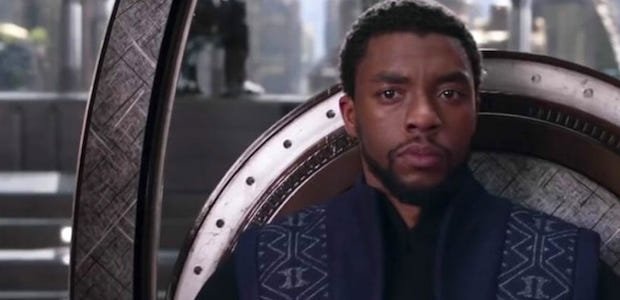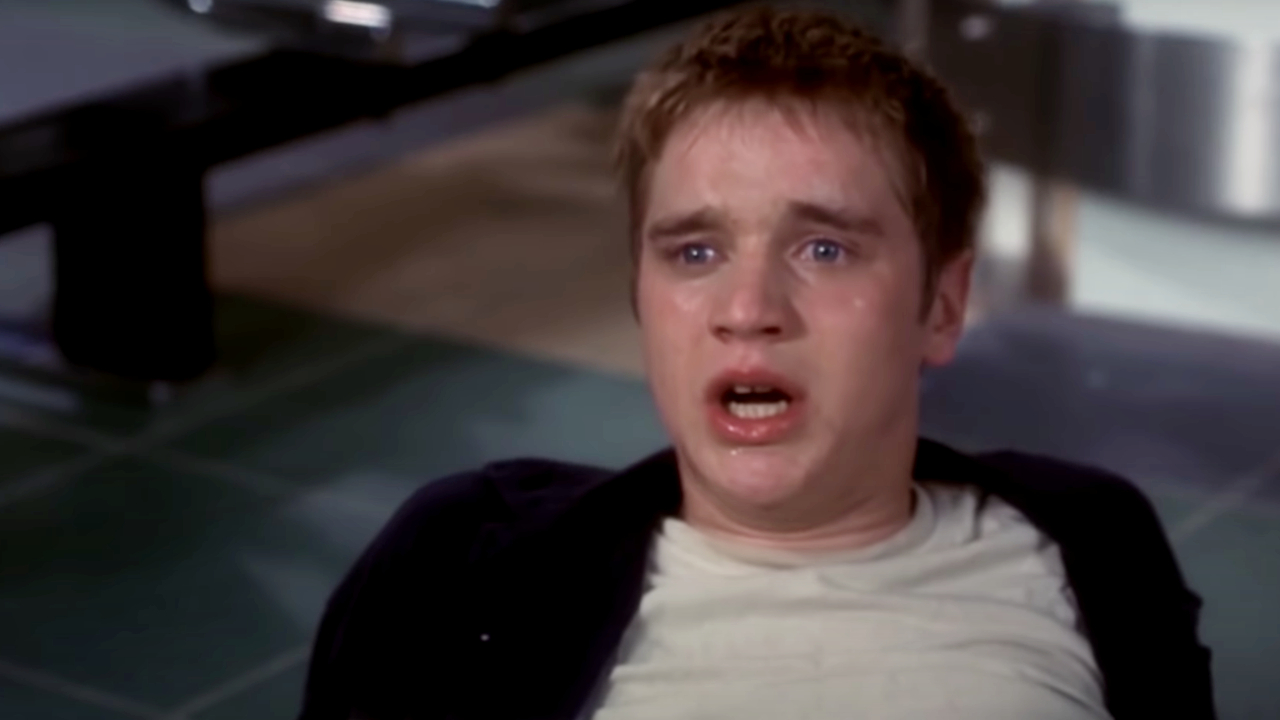Words can't adequately encapsulate how vital Ryan Coogler's Black Panther is at this stage of the comic book movie genre. It's not just our first solo film focusing entirely on a largely-black cast full of strong female characters. It's not just King T'Challa's first adventure, and our first good look at the mysterious African nation of Wakanda. It's not just the final solo outing before Marvel's massive Avengers: Infinity War. Black Panther is all of those things, and so much more. With the weight of its release in mind, many have wondered if Black Panther could deliver on its lofty promises. Luckily, despite some storytelling and technical shortcomings, the film is ultimately a flawed-yet-powerful look at international policy, racial politics, and familial obligations that hits the mark more often than it misses.
Taking place shortly after the events of Captain America: Civil War (the first Phase 3 film isn't required viewing, but it definitely helps), Black Panther opens on its titular badass (Chadwick Boseman) returning home to the hidden African nation of Wakanda after handing over Zemo (Daniel Bruhl) to the American government. Once home, he must take his newly-deceased father's place as King, continue to defend his land as the mythical Black Panther, reconsider Wakanda's previous isolationist policies towards international conflict, and deal with a growing threat from Erik Killmonger (Michael B. Jordan), an American with an unusually-deep knowledge of Wakandan customs. Along the way, he kicks some serious ass and helps introduce audiences to an entire country and supporting cast that will likely become vital when Thanos (Josh Brolin) eventually strolls into town.
At its core, Black Panther continues to prove that Marvel movies work best when they bend genre and blend elements from other styles of film. In the case of Black Panther, the story feels equal parts James Bond and The Lion King with an awesome dash of Star Wars thrown in for good measure. It sounds crazy, but when the film kicks into high-gear, you can plainly see how those qualities coalesce into something extraordinary.
The problem is that Black Panther takes a while to really find its footing. Although the film is mostly self-contained from the rest of the Marvel Cinematic Universe, putting all of the pieces into place from the fallout of Captain America: Civil War takes time, and the first act feels like the slowest and the weakest portion of the film. Things get much better once the central story gets moving, but there's a strong case to be made for the argument that Black Panther doesn't handle the transition out of Civil War as well as Spider-Man: Homecoming, and that it would've been better as a straight origin movie.
With that said, Chadwick Boseman continues to prove that he was born to play Black Panther as he steps into the spotlight, but the supporting cast deserves acknowledgment here, as well. In Black Panther, Ryan Coogler has assembled arguably the best ensemble of characters ever seen in a Marvel movie, with the endlessly snarky Shuri (Letitia Wright), the dutifully-badass Okoye (Danai Gurira), and the delightfully campy Ulysses Klaue (Andy Serkis) all standing out as potential fan-favorites.
Marvel has long been criticized for using villains that don't quite live up to the strengths of the heroes, but here the opposite is almost true. Killmonger is charming, brutal, intense, and intelligent in all of the ways that you want a bad guy to match an awesome hero like T'Challa. At this point, attention needs to be paid to Michael B. Jordan -- who is easily the standout within the film's stacked cast. When all is said and done, he leaves little room for doubt that Killmonger will go down as one of the MCU's best villains to date.
On the other hand, the strength of that overall ensemble means that some characters do eventually get left by the wayside. Personalities like Nakia (Lupita Nyong'o) and Ramonda (Angela Bassett) don't get as much to do as the story progresses, and the hope remains high that they will be allowed to take on more prominent roles as Wakanda becomes a more critical part of the Marvel Cinematic Universe.
Still, the colorfulness of the characters in Black Panther is matched only by the sheer impressiveness of the world itself. Ryan Coogler has done something fantastic with the creation of Black Panther's settings, as he effortlessly balances darker and grittier urban environments (a skill he already established with Fruitvale Station and Creed) with the more outlandish sets of Wakanda. Between the absolutely awe-inspiring technologies (primarily due to the country's vast Vibranium deposits), the sweeping African vistas, and the genuinely remarkable set design, Wakanda is probably the most visually-impressive location ever seen in a Marvel film -- not to mention fascinating, when we factor in Wakanda's similarly-unique socio-political customs and traditions that make it wholly distinct from any other comic book movie.
Alas, arguably the most substantial issue with Black Panther is the fact that its actual execution often fails to live up to the vision backing it up. Make no mistake, this is an absolutely beautiful movie in most respects, but there are several sequences in which the computer-generated effects just don't do the world of Wakanda justice. While most of the film's action (notably a single-take brawl in a casino) is incredible, several of the sequences of T'Challa in the Panther suit feel more like video game cutscenes than sequences from a major Hollywood blockbuster. Beyond that, many of the fight scenes have that ragdoll weightlessness that sometimes bogs down CGI-heavy action sequences. Considering the heavy-handed punches that Ryan Coogler was able to deliver in Creed, this can become something of a letdown. It's not enough to ruin the film, but it serves as a constant reminder that the film industry still has a way to go if it wants its movies to live up to the lofty visions of their directors.
Ryan Coogler's Black Panther is one of the Marvel Cinematic Universe's most powerful, moving, and thematically resonant films to date. It's also one of its most uneven, when all is said and done. Marvel Studio's Phase 3 still has yet to produce a single bad movie. Having said that, Black Panther's clunky first act, sometimes cumbersome cast size, and hit-or-miss visuals make this one of Phase 3's most inconsistent entries to date.
Originally from Connecticut, Conner grew up in San Diego and graduated from Chapman University in 2014. He now lives in Los Angeles working in and around the entertainment industry and can mostly be found binging horror movies and chugging coffee.
Kevin Bacon Has Some Beef With James Gunn Calling Him Out In The First Guardians Of The Galaxy Movie: 'I Don't Get Paid For You Saying My Name'
Chris Evans And Michael B. Jordan Have Already Played Human Torch, But Fantastic Four's Joseph Quinn Knows What's 'Sexy' About His Own Take












